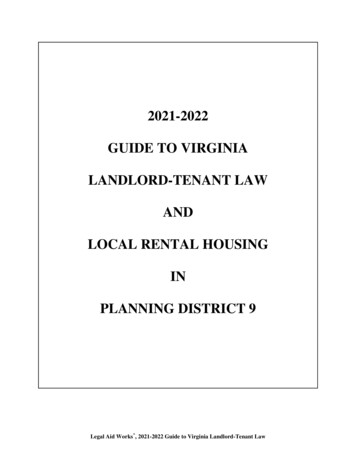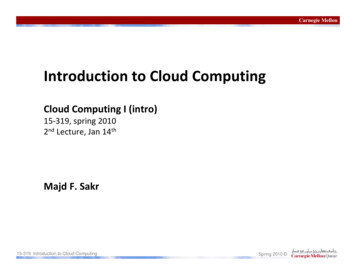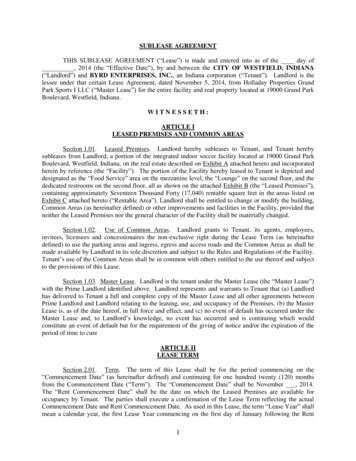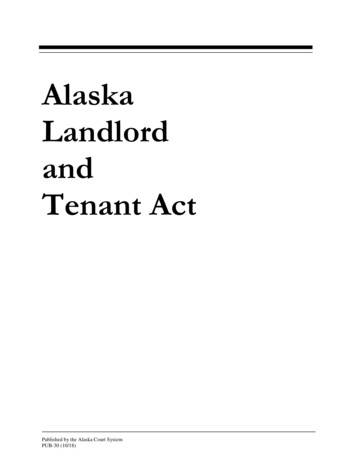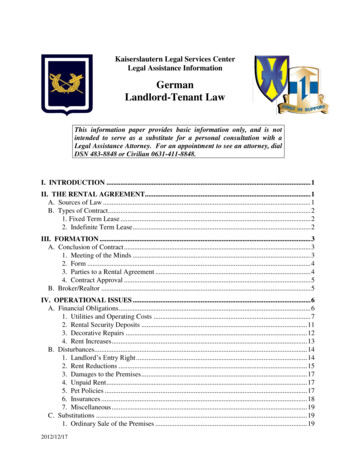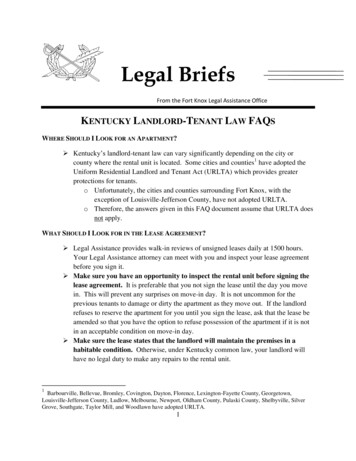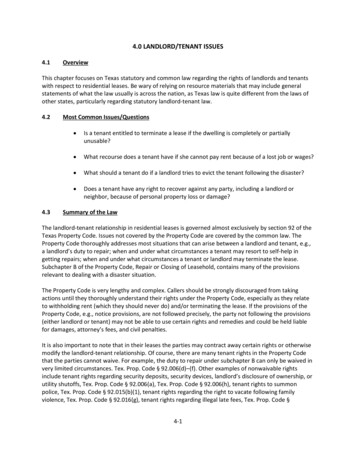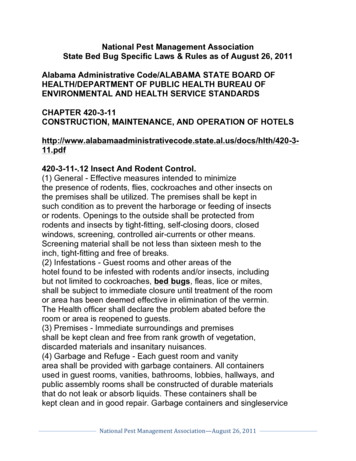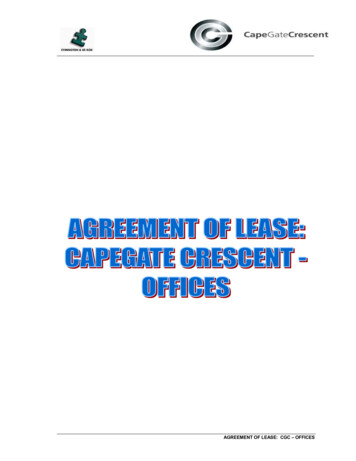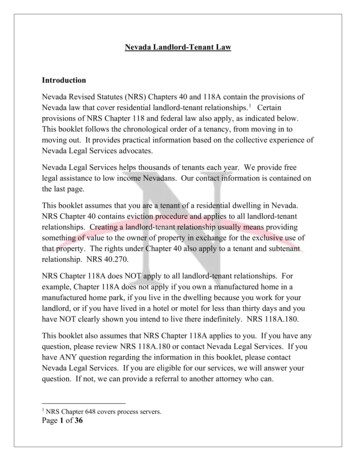
Transcription
Nevada Landlord-Tenant LawIntroductionNevada Revised Statutes (NRS) Chapters 40 and 118A contain the provisions ofNevada law that cover residential landlord-tenant relationships. 1 Certainprovisions of NRS Chapter 118 and federal law also apply, as indicated below.This booklet follows the chronological order of a tenancy, from moving in tomoving out. It provides practical information based on the collective experience ofNevada Legal Services advocates.Nevada Legal Services helps thousands of tenants each year. We provide freelegal assistance to low income Nevadans. Our contact information is contained onthe last page.This booklet assumes that you are a tenant of a residential dwelling in Nevada.NRS Chapter 40 contains eviction procedure and applies to all landlord-tenantrelationships. Creating a landlord-tenant relationship usually means providingsomething of value to the owner of property in exchange for the exclusive use ofthat property. The rights under Chapter 40 also apply to a tenant and subtenantrelationship. NRS 40.270.NRS Chapter 118A does NOT apply to all landlord-tenant relationships. Forexample, Chapter 118A does not apply if you own a manufactured home in amanufactured home park, if you live in the dwelling because you work for yourlandlord, or if you have lived in a hotel or motel for less than thirty days and youhave NOT clearly shown you intend to live there indefinitely. NRS 118A.180.This booklet also assumes that NRS Chapter 118A applies to you. If you have anyquestion, please review NRS 118A.180 or contact Nevada Legal Services. If youhave ANY question regarding the information in this booklet, please contactNevada Legal Services. If you are eligible for our services, we will answer yourquestion. If not, we can provide a referral to another attorney who can.1NRS Chapter 648 covers process servers.Page 1 of 36
Part One-Moving InI.Lease RequirementsNevada law does not require a written lease with your landlord, except if you rent adwelling for more than 1 year. NRS 111.210 and 118A.160. Many landlords usethe same form over many years. Sometimes, these forms contain illegal provisions.You should read your entire lease before signing it. If you disagree with anyprovision, you should ask your landlord to change or cancel it. You cancel theprovision by crossing out the disputed sentences and putting your initials, along withthe landlord’s initials, beside the deleted portion.The following information will help you figure out if your lease contains anythingillegal. If your lease contains an illegal provision, NRS 118A.200(5) and118A.220(1)(a) void or cancel it by operation of law. This means that even thoughyou signed the lease, the law would not allow the landlord to enforce it against you.At the same time, even though your lease has an illegal provision, it does not meanthe entire lease is void. Leases usually have a savings clause that allows enforcementof the lease despite an unenforceable or illegal provision.Pay attention to the duration of the lease, when it begins and ends, the amountcharged for rent and late fees, and the amount you must deposit as security.Always get a copy of any lease that you sign.If a landlord offers a written lease, NRS 118A.200 requires:1.2.3.The lease must be signed by you and landlord or manager.The landlord must provide a free copy of the lease to you.The lease must contain certain terms, such as:(a) Duration of the agreement (six months/twelve months/etc);(b) Amount of rent and the manner and time of its payment;(c) Occupancy by children or pets;(d) Services included with the dwelling;(e) Fees which are required and the purposes of the fee;(f) Deposits which are required and the conditions for their refund;Page 2 of 36
(g) Charges which may be required for late or partial payment of rent or forreturn of any dishonored check;(h) Inspection rights of the landlord;(i) A listing of persons or numbers of persons who are to occupy the dwelling;(j) Respective responsibilities of you and the landlord as to the payment ofutility charges;(k) A signed record of the inventory and condition of the premises under yourexclusive custody and control;(l) A summary of the provisions of NRS 202.470 (criminal nuisance);(m) Information regarding the procedure by which you may report to theappropriate authorities: (1) A nuisance or (2) A violation of a building, safetyor health code or regulation;(n) Information regarding your right to display the U.S. flag, as set forth inNRS 118A.325.Any written lease that violates the previous terms is void. NRS 118A.200(6).Presumptions when lease is silentIf your written or verbal lease does NOT address the following matters, NRS118A.200(5) presumes that:(1) There are no restrictions on occupancy by children or pets.(2) Maintenance and waste removal services are provided without charge toyou.(3) No charges to the tenant for partial or late payments of rent or fordishonored checks.(4) Other than normal wear, the premises will be returned in the samecondition as when the tenancy began.This means that if your verbal or written lease does not contain any provisionregarding late fees, the landlord cannot charge anything for the late payment of rent.Page 3 of 36
Prohibited lease termsNRS 118A.220(1) prohibits any lease that requires you to:(1) Give up any right under NRS Chapter 118A;(2) Confess judgment (admit in a formal court document) for any claimarising out of lease or give up any future legal claim against the landlordbased on the landlord’s actions or omissions;(3) Pay the landlord’s attorney’s fees, but the prevailing party may claimattorney’s fees;(4) Provide notice longer than notice the landlord must supply to you.Any lease provision that forces you to give up rights under Nevada NRS Chapter118A is void and you can sue the landlord for any actual damage caused by theillegal provision. NRS 118A.220(2).Can a landlord change lease terms?NRS 118A.320 allows the landlord to change some lease terms, but not if thechange affects (1) how much you pay for rent, utilities, or other charges, or (2) theduration of the lease. The change must also(1)(2)Apply to all tenants, andPromote the convenience, safety or welfare of the landlord or tenants,preserve the landlord’s property from abusive use, or make a fairdistribution of services and facilities held out for the tenantsgenerally.For any change in lease terms that does not affect payments or duration, thelandlord must provide thirty days written notice. If you agree in writing, thechange can happen immediately or anytime less than thirty days. NRS118A.320(2)If your lease has expired, you landlord must provide 30 days notice of any rentincrease, if you rent by the week, or 60 days notice if you rent for any longerperiod of time.Page 4 of 36
II.Security DepositsNRS 118A.240, 118A.242, and 118A.244, govern security deposits in Nevada.What is a security deposit?A security deposit is an amount of money you provide to compensate the landlordfor any unpaid rent or late fees, cleaning costs, and the cost of repairing damages,other than ordinary wear and tear. NRS 118A.240. A security depositcompensates the landlord for any of these costs incurred after you move out.“Security” is NOT a surety bond.How much can a landlord require for a security deposit?A landlord cannot require a deposit and nonrefundable cleaning fee that exceedsthree months’ rent. NRS 118A.240 and 118A.242. If your landlord requires youto pay the last month’s rent, then the security deposit and nonrefundable cleaningfee cannot exceed two months’ rent. During the term of your lease, a landlordcannot require you to deposit more for security. NRS 118A.320. If a new ownertakes over, the new owner cannot require you to deposit more for security for thirtydays or the duration of your lease, whichever is longer. NRS 118A.244(3)(b).A security deposit cannot be nonrefundable, but the landlord can charge anonrefundable cleaning fee. NRS 118A.242.What is a surety bond?A security deposit can also be a surety bond. Although Nevada law allows asurety bond instead of a security deposit, your landlord cannot require the bondand you cannot force the landlord to accept it. NRS 118A.242(2) and (3). Also,your landlord should not be able to evict you if you do not purchase a suretybond. This may be viewed as retaliation under NRS 118A.510(1)(f).If you and the landlord agree to have surety bond instead of a deposit, you willpay an up-front fee for the bond that will cover the legal deductions normallyPage 5 of 36
paid by your security deposit. If you disagree with the charges, you must notifythe surety bond company in writing. The surety bond can sue you for damages ifthe bond does not cover the costs allowable under NRS 118A.242. If the suretybond pays the landlord for damages that did not occur or are not allowable underNRS 118A.242, you may have to sue both the surety bond company AND thelandlord. Because of this burden, we do not recommend that any tenant pay for asurety bond.What can a landlord legally deduct from my security deposit?NRS 118A.242 allows the landlord to claim from your security deposit or suretybond the cost to repair any damage to the dwelling, other than ordinary wear andtear, cleaning fees, and unpaid rent and late fees. These costs must have beencaused by you. These costs must also be reasonable and lawful. The landlord canalso claim any amount owed under your lease, but cannot deduct this amount fromyour security deposit or the surety bond. NRS 118A.242. The landlord has toreturn your security deposit within thirty days of you vacating the dwelling. If thelandlord deducts any amount from your deposit, the landlord has to provide awritten accounting to you within those thirty days.How can I get my deposit back?If the landlord fails to return your deposit and does not provide a writtenaccounting within thirty days of moving, you can sue the landlord for up to twotimes the amount of your security deposit: your original deposit, plus statutorydamages in an amount up to your original deposit. In deciding whether to awardstatutory damages, the judge can consider: (a) Whether the landlord acted in goodfaith; (b) The course of conduct between the landlord and you; and (c) The degreeof harm to you caused by the landlord’s conduct. NRS 118A.242(4). Keep inmind the landlord can countersue you for any amount due under your lease.What can I do if I disagree with the landlord’s deductions?If you disagree with any deductions the landlord has made, you can sue thelandlord. If the landlord has made any deductions to your security deposit, youhave three arguments: (1) the damage did not occur; (2) the deductions were notwarranted under the law; and (3) the costs were unreasonable, if warranted.Page 6 of 36
For example, the landlord deducted the cost to repaint your dwelling based onmany chips and scuffs on the walls. You deny this damage and your argumentagainst this charge would be the damage did not occur (argument 1). If you livedin the dwelling for 10 years, you could also argue that the damage was ordinarywear and tear and thus, the deduction would not be warranted under NRS118A.242 (argument 2). If the landlord charged 10,000 to repaint, then you couldalso argue the costs were unreasonable (argument 3).***Part 2-Problems After Moving InI.Problems with your dwellingBasic requirementsNevada law requires a landlord to maintain a habitable dwelling unit. “Habitable”generally means livable or capable of allowing an average person to use and enjoythe dwelling and live free of defects affecting health or safety.Under NRS 118A.290, your dwelling must comply with health and housing code,and have:(1) hot and cold running water;(2) floors and walls that provide adequate weather protection and do notleak;(3) a working toilet;(4) doors and windows that open, close, and fit properly;(5) electrical outlets and wiring that operate safely;(6) building and grounds free of garbage, rodents, insects, and vermin;(7) adequate heat;(8) other services, like ventilation, air conditioning, elevators, stoves,refrigerators, if supplied by the landlord when you moved in or required inyour lease. In addition, the landlord may agree to provide appliances orfurniture, and these items must also work properly.Air conditioning, if not provided in your lease or in good working order when youmove in, is NOT required under NRS 118A.290. Your lease may also require youto make repairs and perform maintenance tasks, so check your lease beforecomplaining about any habitability problem or lease violation.Page 7 of 36
NRS 118A.350, 118A.355, 118A.360, and 118A.380 contain your remedies if thelandlord has failed to maintain a habitable dwelling. These laws have differentrequirements and a diagram follows this section.NRS 118A.350 covers lease violations. NRS 118A.355 covers habitabilityviolations (NRS 118A.290). NRS 118A.360 covers lease and habitabilityviolations. NRS 118A.380 covers essential items or services only.Habitability and Lease ViolationsNRS 118A.350, 118A.355 and 118A.360 contain remedies for habitability andlease violations. NRS 118A.350 covers lease violations and your remedies if thelandlord violates your lease. You cannot withhold rent under NRS 118A.350 andthis is the only difference between the remedies for lease violations under NRS118A.350 and habitability violations under NRS 118A.355.Remedies for essential items or services violations are contained in NRS118A.380, and discussed in the Essential Items or Services section below. For ahabitability violation, the following procedure must be used.You must provide written notice to landlordIf you have a habitability problem with your dwelling, Nevada law requires you toprovide written notice of the problem to the landlord or manager. Verbal notice orwork orders are generally insufficient.To pursue your rights under Nevada law, you should have evidence that youinformed the landlord of a particular problem. The written notice is evidence.Also, you cannot seek these remedies if you or a member of your household causedthe problem.You must allow time for landlord to fix problemNevada law provides time for a landlord to fix the habitability problem. Forproblems other than essential services, you must give the landlord 14 days to fixthe problem. If you want to repair and deduct and have an emergency, you canPage 8 of 36
require the landlord to fix the problem sooner than 14 days, but no sooner than 48hours after issuing the notice.Remedies if the landlord does not fix the problemIf the landlord fails to fix or make a reasonable attempt to fix the problem, you cansue for damages, terminate your rental agreement and move out, withhold rent thatbecomes due, and repair and deduct. You cannot withhold rent if you owe rent tothe landlord. Also, if you withhold rent, you must deposit your rent into an escrowaccount with the justice court. Unless you deposit your rent with the court, youwill not have a defense if the landlord tries to evict.Repair and deductYou can also repair the problem yourself and deduct the cost from next month’srent. You can only repair the problem yourself if it will not cost more than onemonth’s rent, and you can only repair and deduct a total of one month’s rent everytwelve months. Also, your lease may specify a person or company who mustperform the work needed to fix the problem. Check your lease before you callanyone to repair the problem.CondemnationYou can also contact your local building or health inspector if the problem isserious. The inspector could order the landlord to fix the problem or facecondemnation. If the inspector condemns your dwelling, you will be forced toleave.Substitutes for written noticeIf you are suing the landlord for money damages under NRS 118A.350 and118A.355, you do not need to issue a written notice if the landlord admits in courtof knowing about the problem. This rarely happens.If you want to withhold rent under NRS 118A.355, you do not need to issuewritten notice if the landlord has already received notice from code enforcement orsome other government agency. Still, you must deposit your rent into an escrowaccount with the justice court.Page 9 of 36
Yet, we still strongly advise you to send your own notice, keep a copy of thenotice, and wait fourteen days for the landlord to fix the problem. Always keep acopy of the notice that you give your landlord. You will need it as proof that youhave complied with Nevada law if you decide to sue your landlord in court fordamages or as a defense if your landlord should try to evict you.Landlord fixes the problemIf your landlord has completed the repairs, you must immediately pay the landlordany rent that you have lawfully withheld.RetaliationIf you withhold rent, the landlord could try to evict you using a five day pay rent orquit notice. This would violate Nevada law. See Part 3-Retaliation.Essential Items or ServicesUnder NRS 118A.380, “essential items or services” are heat, air-conditioning, hotand cold running water, electricity, gas, a working door lock, or another essentialitem or service. Air conditioning is only an essential service if it is required inyour lease or the service worked when you moved in. In Southern Nevada, mostdwellings have air conditioning. You should always make sure your airconditioner works before moving in.If you are going to use the remedies for essential services problems under NRS118A.380, Nevada law prohibits you from also using the habitability remedies ofNRS 118A.350 and 118A.360 under the previous section.Willful or negligentIf the lack of essential services is the result of the landlord’s willful or negligentactions or inaction, then you can pursue your remedies under NRS 118A.380. Ifthe essential services problem is not the result of willful or negligent actions of thelandlord, then you must pursue the remedies under the previous sectionHabitability and Lease Violations.Page 10 of 36
Written notice and forty-eight hours to fixThe landlord must treat your lack of essential services as an emergency that mustbe repaired within forty-eight hours. You should first provide written notice toyour landlord and request that the repairs be made within forty-eight hours. Theseforty-eight hours do not include weekends or holidays.What can I do if the landlord does not fix the problem?If the landlord does not make the repairs, or does not make a good faith effort tocomplete the repairs, you can choose to do the following:a. Obtain or repair the essential services on your own, like a space heater,and deduct the cost from your next month’s rent (you may have to use aperson or firm specified in the lease to make these repairs);b. Sue your landlord for actual damages, including the reduction in thevalue of your use of your home;c. Withhold any rent that becomes due. You cannot be charged late feesuntil your landlord has attempted in good faith to repair the essentialservice. You do NOT need to deposit your rent into escrow with thecourt. You can choose this option only if rent is current at the time yougive your landlord the written notice; ord. Obtain comparable substitute housing during the time that your essentialservice is not working. While you are renting the substitute housing, youdo not owe your landlord any rent. If the substitute housing costs morethan the rent that you pay to your landlord, you can recover the differencein cost from your landlord.Substitutes for written noticeIf you are suing the landlord for money damages under NRS 118A.380, you do notneed to issue written notice if the landlord admits in court of the problems. Thisrarely happens.Page 11 of 36
If you want to withhold rent or sue for damages under NRS 118A.380, you do notneed to issue written notice if the landlord has already received notice from codeenforcement or some other government agency.In both cases, however, we strongly advise you to send your own notice, keep acopy of the notice, and wait forty-eight hours for the landlord to fix the problem.Always keep a copy of the notice that you give your landlord. You will need it asproof that you have complied with Nevada law if you decide to sue your landlordin court for damages or as a defense if your landlord should try to evict you.What if the landlord fixes the problem?If your landlord has completed the repairs or your essential services have beenrestored, you must immediately pay the landlord any rent that you have lawfullywithheld.What if the landlord tries to evict me?If you withhold rent, the landlord could try to evict you using a five day pay rent orquit notice. This would violate Nevada law. See Part 3- Retaliation.Page 12 of 36
Habitability Notices and Remedies118A.350Lease Violation118A.355Chapter 118AViolationPage 13 of 3614 days14 days118A.360Lease or Chapter118A Violation14 days to 48hours inemergency118A.380EssentialServices48 hoursTerminate leaseand sue foractual damagesWithhold rent,terminate lease,sue for actualdamagesRepair anddeductR and D, sue,withhold rent,rent abatement
Part 3-Retaliation and the Fair Housing ActI.RetaliationNRS 118A.510 protects you from retaliation. Retaliation requires twocomponents: (1) your protected activity and (2) the landlord’s reaction.1.Your protected activity includes:(a) Complaining to the police about criminal conduct;(b) Complaining to the landlord about any violation of NRS Chapter118A, usually habitability;(c) Complaining about building, housing, or health code violations to anappropriate government agency;(d) Joining a tenant’s union or similar organization;(e) Raising the landlord’s violation of habitability law in a judicial oradministrative proceeding;(f) Refusing to give written consent to a proposed rule of landlord thatrequires a waiting period (usually thirty days under NRS 118A.320); or(g) Complaining to the landlord, HUD, or other appropriate person oragency regarding the landlord’s violation of the federal Fair Housing Act orNRS 118.100; or(h) Being the victim of domestic violence.2.If you participate in the protected activity or have been the victim ofdomestic violence, the landlord cannot react by:(a) Threatening to serve or serving an eviction notice, unless the eviction isbased on the failure to pay rent, nuisance, or a lease violation,(b) Increasing your rent, orPage 14 of 36
(c) Decreasing essential services required by NRS Chapter 118A or thelease.If the landlord has retaliated against you, NRS 118A.510 allows you to sue thelandlord for 2,500 in statutory damages, plus actual damages.II.The Fair Housing ActThe Fair Housing Act (42 U.S.C. Sections 3601 to 3631) provides protections toyou and prevents a landlord from not renting to you, treating you differently whileyou reside in the dwelling, or evicting you.Protected classesA landlord cannot discriminate against you because of your race, color, nationalorigin, religion, sex, familial status (including pregnant women, children under theage of 18 living with parents or legal custodians, and people securing custody ofchildren under the age of 18), and handicap (disability).Prohibited actions by a landlordThe landlord cannot (1) refuse to rent to you, (2) selectively enforce rules againstyou, or (3) evict you, based on your protected class. 42 U.S.C. Section 3604.The Fair Housing Act also prohibits the landlord from steering you to a particularplace in the complex to live with other members of a protected class. The landlordalso cannot refuse to accommodate your disability. For example, the landlordusually must provide a handicapped parking space if you have a verified physicaldisability.Discrimination under Nevada lawNRS Chapter 118 contains Nevada’s anti-discrimination laws. These laws mirrorthe federal Fair Housing Act, except Nevada law includes sexual orientation andgender identity in the protected classes. NRS 118.100.Page 15 of 36
Part 4-Leaving So Soon?I.Surrender and AbandonmentUnder NRS 118A.480, a landlord does not have to issue any eviction notice if youvoluntarily surrender or give up possession, like turning in your keys; or if youabandon the dwelling, like being away from your home for an extended period oftime. A landlord usually cannot presume surrender and it must be something thatyou do or say to the landlord, like turning in your keys. A landlord can onlypresume abandonment if you have not paid the rent and been away for more than½ of the rental term, more than fifteen days if you pay by month, and three days ifyou pay rent by the week. NRS 118A.450.Can the landlord keep the property I leave behind?Even though the landlord may be able to presume abandonment and lock you outwithout notice, the landlord still cannot refuse to allow you to retrieve the propertyyou leave behind. NRS 118A.460. See Part 5(I)-Property Left Behind.II.EvictionNRS Chapter 40 contains Nevada’s landlord-tenant eviction laws. NRS Chapter40 contains three eviction procedures: (1) summary eviction under NRS 40.253,(2) expedited housebreaker under NRS 40.414 and 40.416, and (3) the more formalunlawful detainer process under NRS 40.290 through 40.420.Summary eviction applies except when you own a manufacture home in amanufactured home park or when your dwelling has been sold or foreclosed.Housebreaker applies when you break into a house and begin living there or yourent a house from someone other than the owner or agent. A housebreaker is alsosubject to summary eviction and the plenary process. The plenary unlawfuldetainer process applies after losing a housebreaker or summary eviction case, or isthe exclusive eviction procedure for the resident of a manufactured home or in ahome after transfer of ownership through sale or foreclosure.The more popular eviction process is summary eviction. This booklet does notcover the plenary eviction process, except with regard to foreclosures or transfer ofPage 16 of 36
ownership below. Generally, service of a seven day pay rent or quit notice or fiveday unlawful detainer notice signals summary eviction.Summary EvictionSummary eviction is an informal process where the tenant must only raise, notprove, a legal defense to the eviction. If the tenant can establish a legal defense,the court must deny the summary eviction. The Nevada Supreme Court hasdetermined that “legal defense” is when you raise a “genuine issue of materialfact.” Anvui, LLC v. Dragon, LLC, 163 P.3d 405 (2007). Most legal defenses areset forth below.You can also raise a legal defense when you question the power of the landlord orcourt to hear your case. This defense attacks the court’s jurisdiction and usuallyinvolves notice issues such as the lack of notice, the wrong notice, or theimproperly served notice. You should contact Nevada Legal Services or consultwith another attorney if you want a raise a jurisdiction defense.NRS Chapter 40 provides several reasons a landlord can use for eviction. NRS40.251 allows the landlord to serve a thirty day or seven day no cause evictionnotice. NRS 40.2514 allows the landlord to serve a three day nuisance notice.NRS 40.2516 allows the landlord to serve a five day lease violation notice. NRS40.253 allows the landlord to serve a seven day pay rent or quit notice. We willdiscuss these notices next. NRS 40.255 allows the new owner of property to servea sixty day, thirty day or three day notice after foreclosure or sale, but this noticewill be discussed in Part 6-Foreclosure and Tenant’s Rights.How much time do I have?Nevada Rules of Civil Procedure, and the comparable Justice Court Rules of CivilProcedure, govern notices in Nevada courts. Rule 6 governs the counting of dayswhen a landlord issues an eviction notice. 22As of September of 2019, Justice Court and District Court have different versions of Rule 6.Justice Court excludes weekends, holidays, and non-judicial days counting 10 days or less.District Court counts these days.Page 17 of 36
If you have received a seven day pay rent or quit notice, NRS 40.253 allows youuntil close of business (when court closes) on the seventh day following service ofthis notice to pay the rent, move, or file an affidavit with the justice court. InJustice Court, you do not count the day you are served, weekends, holidays, andother days the court is closed. Some courts have four day weeks and you do notcount the Friday or Monday the court is closed. In District Court, you count everyday except the day of service.You must file by close of business on the 7th day and this usually means you willhave until close of business of the 9th day following service of the notice. Thisdoes not apply if you are served on a weekend or a holiday. Also, if the last day isa weekend or holiday, you then have until the next day the court is open.If you have received any other notice ten days or less, you count days beginningthe day after receiving notice. You do not count the day you are served, weekends,holidays, and other days the court is closed. Some courts have four day weeks andyou do not count the Friday or Monday the court is closed. In District Court, youcount every successive day except the day of service.If your notice is more than ten days, then you do not count the day you are served.You then count every day after being served INCLUDING weekends, holidays,and all other days the court is closed. If the last day is a day the court is closed,then you must count the next day the court is open. This is ALWAYS the way tocount in District Court.Service of eviction noticeNRS 40.280 contains the legal requirements for serving an eviction notice. If youhave received an eviction notice, you probably should not argue insufficient noticewithout an attorney. However, if you have NOT received any eviction notice andconstable or sheriff is going to evict you, then you would have a legal defense tothe eviction because service was insufficient and the court does not havejurisdiction to enter an eviction order. You must file a motion right away and wesuggest contacting N
Nevada Landlord-Tenant Law . Introduction . Nevada Revised Statutes (NRS) Chapters 40 and 118A contain the provisions of Nevada law that cover residential landlord-tenant relationships. 1. Certain provisions of NRS Chapter 118 and federal law also apply, as indicated below. This booklet follows the chronological order of a tenancy, from moving .
